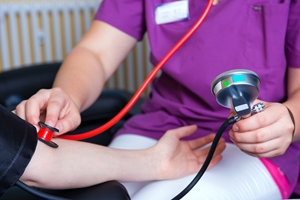
At each prenatal appointment, you'll notice the nurse taking and recording your blood pressure. Throughout your pregnancy, your doctor or midwife will monitor your pressure, making sure the top and bottom numbers don't rise above 140 and 90 respectively.
What's all the fuss?
Whether you had high blood pressure prior to conceiving, or it's cropped up now that you're pregnant, your health care provider will want to keep it in check. Allowing your blood pressure to go uncontrolled can have some pretty serious consequences for you and your little one. Just some of those outcomes include:
Issues with the placenta: High blood pressure can decrease the amount of blood flowing to the placenta. In turn, your baby may receive less oxygen and the nutrients he or she needs to grow. If this is the case, your doctor or midwife will worry about your little one's growth and development and the increase risk of preterm birth.
Preeclampsia: This is a fancy word for the placenta separating from the uterine wall before labor even begins. This can damage the placenta and cause severe bleeding. It's a potentially life-threatening situation that your doctor or midwife is consistently monitoring you for.
Preterm birth: In order to safeguard you and your baby's health from the risks of high blood pressure, your doctor or midwife may talk to you about delivering early. Inducing labor before 39 weeks is sometimes medically necessary, as the benefits would outweigh the risks of early delivery. It goes without saying that allowing your baby to complete gestation and develop fully makes for a smoother delivery and safer and healthier baby.
What to watch for
High blood pressure is often the first symptom of preeclampsia, though high blood pressure itself can be a problem on its own. If you notice any of the following symptoms, get in touch with your health care provider right away. These are the warning signs for preeclampsia, which should never be ignored:
- Blurred vision
- Severe headaches
- Pain in your abdomen
- Nausea or vomiting
- Trouble urinating
- Shortness of breath
Healthy steps to take
If you've had high blood pressure in the past, or you're worried about your potential for it, there are some healthy lifestyle changes you can make right now.
- Eat a well-rounded, low fat and plant-based diet.
- Exercise gently, getting your provider's permission first, of course.
- Don't miss an appointment. Your doctor or midwife is your best bet for keeping your blood pressure under control. Never miss prenatal appointments, as they exist to safeguard your little one's health.


Leave a Reply